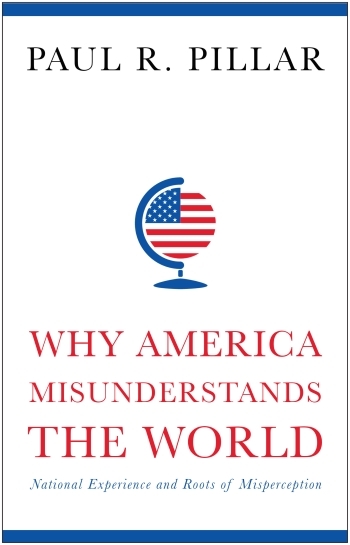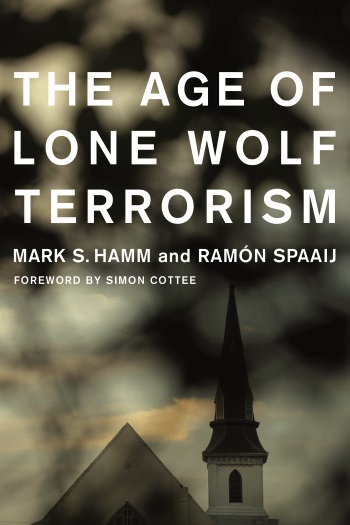The American View of War
“Why America Misunderstands the World examines how this process applies to the United States—the sole superpower, with a history and circumstances especially unusual among nations—and to how Americans tend to view and interpret foreign policy problems of today.” — Paul Pillar
This week, our featured book is Why America Misunderstand the World: National Experience and Roots of Misperception, by Paul R. Pillar. Today, we are happy to present a guest post from Pillar in which American experiences of World War II have shaped subsequent American foreign policy decisions.
Don’t forget to enter our book giveaway for a chance to win a free copy of Why America Misunderstands the World!
The American View of War
By Paul R. Pillar
A nation’s history can explain a lot about how citizens of that nation, including its leaders, view today’s problems. With nations just as with individuals, past experience colors the way current happenings are seen and interpreted. The coloring often involves distorting and obscuring. The influence of a nation’s particular history and circumstances causes misperception. The misperception in turn leads to errors and troubles that might otherwise have been avoided. Why America Misunderstands the World examines how this process applies to the United States—the sole superpower, with a history and circumstances especially unusual among nations—and to how Americans tend to view and interpret foreign policy problems of today.
Many distinctive circumstances and experiences have shaped the distinctive American worldview, including ones involving the expansion of the United States across a richly endowed continent and its rise to unparalleled global power. But to illustrate the connection between past experience and current ways of thinking, consider America’s past experience with foreign wars. Wars are especially salient chapters in any nation’s experience and especially likely to have an impact on later ways of thinking. To narrow the illustration down even further, consider the American experience with World War II. That war, the bloodiest and most widespread armed conflict in human history, also was America’s biggest and costliest foreign war. Winning it was the greatest achievement of what came to be called America’s greatest generation. The war became the archetype in American minds for how a war ought to be conceived and fought, creating a mold for thinking about later conflicts. But later conflicts have not always fit that mold.
Although many countries were involved in World War II, the line-ups seemed fairly simple and clear: it was the Allies against the Axis—good guys against bad guys. This apparent simplicity, with U.S. leaders focusing less than Britain’s wartime leader Winston Churchill did on temporarily shelved differences with Stalin’s USSR, added to the shock and intensity of the onset of the Cold War. Thinking in terms of clear and simple line-ups added to American misunderstanding of the Cold War itself, with a tendency to misperceive global communism as monolithic. This tendency contributed to the costly Vietnam War, entered into in the mistaken belief that a communist success in Vietnam would be an advance of a unified communist movement. Today, complex multidimensional conflicts such as the war in Syria befuddle policy-makers, with Americans having particular difficulty in trying to fit the many participants into categories of allies and adversaries.
World War II was compatible with a Manichean tendency of Americans to think of foreign conflicts in terms of adversaries who are not only bad guys but downright evil. Certainly the Nazis fit that description. But what followed was a lasting habit of invoking analogies with Hitler and Munich whether the analogies really were applicable or not. All manner of adversaries, such as Iraq’s Saddam Hussein, have been viewed and described in such terms even if they were not really equivalent to Hitler or even close to being so. Much diplomacy gets derided as another Munich even where there is little resemblance to a parley with the Nazis over the Sudetenland. Many Americans associate morality with only one side of some foreign conflicts where neither side has a monopoly on it (e.g., the Israeli-Palestinian conflict). The tendency to demonize adversaries as not just having different interests but as being evil has led to misunderstanding of what makes them tick. The perception, for example, of the Iranian regime as having a fundamentally different way of thinking does not square with behavior showing that regime as employing the same sort of cost-benefit calculations as most other regimes.
The great victory in World War II ended with unconditional surrender of the Axis powers. This, too, has become part of the American archetype of what a war should look like, how it should be fought, and how it should end. This model has spelled discomfort with situations in which no such ending is feasible. In particular, applying war imagery and the World War II model to counterterrorism under the label of a “war on terror” has encouraged the misconception that defeating terrorism is a matter of eliminating a fixed set of bad guys: “the terrorists.” It also has encouraged the mistaken belief that terrorism ever can be defeated in a successful conclusion equivalent to an unconditional surrender in a conventional war.
World War II not only ended with a great victory but was the culmination of a remarkable winning streak for the United States in foreign wars. So winning became part of the expectation, based on a history of more than a century of wars, of what will happen when the United States enters a foreign war. That expectation underlay miscalculations when the United States went to war in places such as Vietnam and Iraq.
History continues to weigh heavily on American perceptions of the outside world, even though the winning streak in wars has ended and more recent experiences might be expected to shape perceptions differently. Americans are not the only people to let longstanding historical baggage color perceptions of present reality. Serbian national mythology, for example, centers on a Serbian military defeat in the fourteenth century and continues to shape how today’s Serbs view Muslims. But the power and reach of the United States mean that Americans’ historically based ways of viewing the world matter much more, for themselves and for the world.




